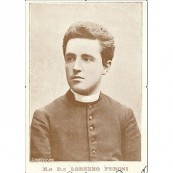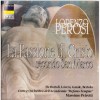| Country: | Italy |
| Period: | Romantique |
Biography
Monsignor Lorenzo Perosi (21 December 1872 – 12 October 1956) was an Italian composer of sacred music and the only member of the Giovane Scuola who did not write opera. In the late 1890s, while he was still only in his 20s, Perosi was an internationally celebrated composer of sacred music, especially large-scale oratorios. Nobel Prize winner Romain Rolland wrote: "It's not easy to give you an exact idea of how popular Lorenzo Perosi is in his native country." [1] Perosi's fame was not restricted to Europe. A 19 March 1899 New York Times article entitled "The Genius of Don Perosi" began: "The great and ever-increasing success which has greeted the four new oratorios of Don Lorenzo Perosi has placed this young priest-composer on a pedestal of fame which can only be compared with that which has been accorded of late years to the idolized Pietro Mascagni by his fellow-countrymen." Gianandrea Gavazzeni made the same comparison: "The sudden clamors of applause, at the end of the [19th] century, were just like those a decade earlier for Mascagni."[2] Perosi worked for five Popes, including Pope St. Pius X who greatly fostered his rise.







